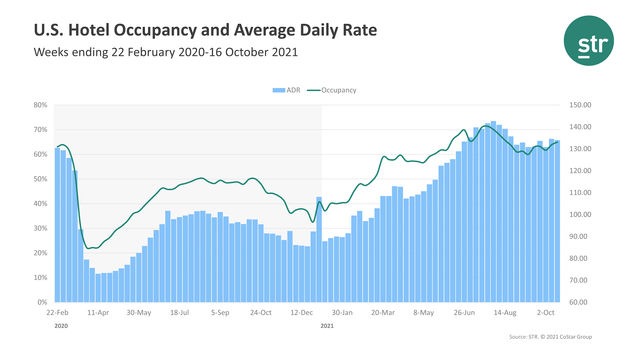WHY IT RATES: The popular train company will look to grow in 2026 with a CEO…

US Hotel Occupancy Levels Reach Highest Peak Since August
Last week, U.S. hotel occupancy reached its highest level since the summer rush in mid-August according to STR’s latest data through October 16. Room rates, however, dipped slightly from the week previous.
For the week of October 10–16, 2021, these were the figures. The percentage change noted by STR is based on the equivalent week in 2019.
ADVERTISING
—Occupancy: 65 percent (-10 percent)
—Average daily rate (ADR): $134.03 (-1.4 percent)
—Revenue per available room (RevPAR): $87.15 (-11.3 percent)
During the three-day Columbus Day weekend (October 8–10), occupancy was 72 percent, whereas it was 75 percent on the same holiday weekend in 2019. But, for the week beginning October 10, week-over-week demand growth was attributable almost exclusively from the Sunday preceding Columbus Day.
While travel continues to rebound, none of the Top 25 Markets saw an occupancy increase that surpassed 2019. Tampa came closest to recovering its comparable 2019 numbers, falling short by just three percent with 66.8 percent occupancy.
The most substantial decline in room occupancy from 2019 levels was reported by the San Francisco/San Mateo area, where it fell by 41.2 percent to 52 percent.
The most profound ADR increase in comparison with 2019 came from Miami, which had risen 13.9 percent to $184.58.

Propelled by ADR, the market reported the greatest RevPAR gain in comparison with 2019, rising 8.9 percent to $88.87.
The largest RevPAR deficits were reported in the San Francisco/San Mateo region, where RevPAR fell 62.1 percent to $90.19, and New York City, where it has slipped 45.5 percent to $163.58 as compared to the same week in 2019.



